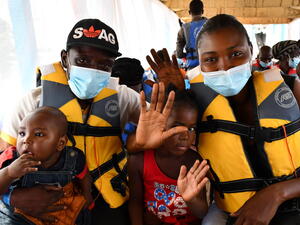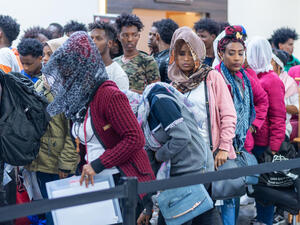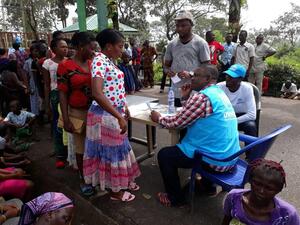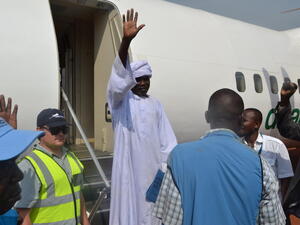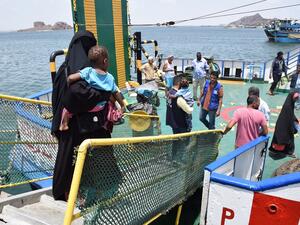Liberian assisted returns cross 10,000 mark
Liberian assisted returns cross 10,000 mark

Liberian returnee Kollie Barco and his team rehabilitating a local school in Naama, Bong county.
NAAMA, Liberia, March 30 (UNHCR) - The first thing Kollie Barco did when he returned to his hometown in Liberia was to cry. It was an unexpected outburst from a strapping 32-year-old who had survived more than 10 years of exile in Guinea.
His tears were from the joy of homecoming and the heartbreak of seeing his shattered community in Naama, Bong county. Houses - including his own - had been overrun by trees and bushes, while the infrastructure had been destroyed in Liberia's 14-year civil war.
The town was in a sad state. Where Camp Naama, the training ground for Liberia's best military personnel, once stood, there now remained only rubble and overgrown weeds.
"My choices were limited," Barco recalls, looking back on that unforgettable day in October last year, when he returned on the first convoy to Liberia organised by the UN refugee agency. He wasted no time on tears and got down to business, using the carpentry skills he had learnt in Guinea's Kouankan camp to rebuild his house.
"After building myself a home, I can now help others to rebuild theirs. In the community, I am called on to do small jobs here and there," says the former refugee, who has rallied other skilled returnees to assist destitute neighbours whose homes have been damaged.
Today, six months after his return to Naama, Barco and his four-man team have won a contract with UNHCR to rehabilitate the local public school. "The assistance we rendered our community helped us to land this contract," says Barco, explaining that the refugee agency was able to use their services based on recommendations from the community.
"As returnees, we can also assist UNHCR and the humanitarian community to restore basic services and some sense of normalcy," he adds.
A total of 10,566 Liberian refugees in the region have returned home with UNHCR assistance since October 2004. The 10,000 mark was crossed last week when three convoys repatriated 963 Liberians from Guinea. All returning refugees receive start-up assistance of food rations, household items and agricultural tools.
In addition, close to 100,000 internally displaced Liberians have returned to their areas of origin under the inter-agency collaborative approach, of which UNHCR is a part.
UNHCR and its partners have so far implemented 1,000 community empowerment projects in Liberia's areas of return. These projects seek to help returnees settle back home and to absorb the impact of mass returns on the local communities. Both groups are directly involved in efforts to repair shelters, roads, water points, schools and clinics, which in turn, provide much-needed jobs in the community.
Reintegration and reconstruction remain key priorities for UNHCR as more refugees are expected to return to Liberia in the months leading up to the presidential elections in October.
By Sarah Brownell
UNHCR Liberia




